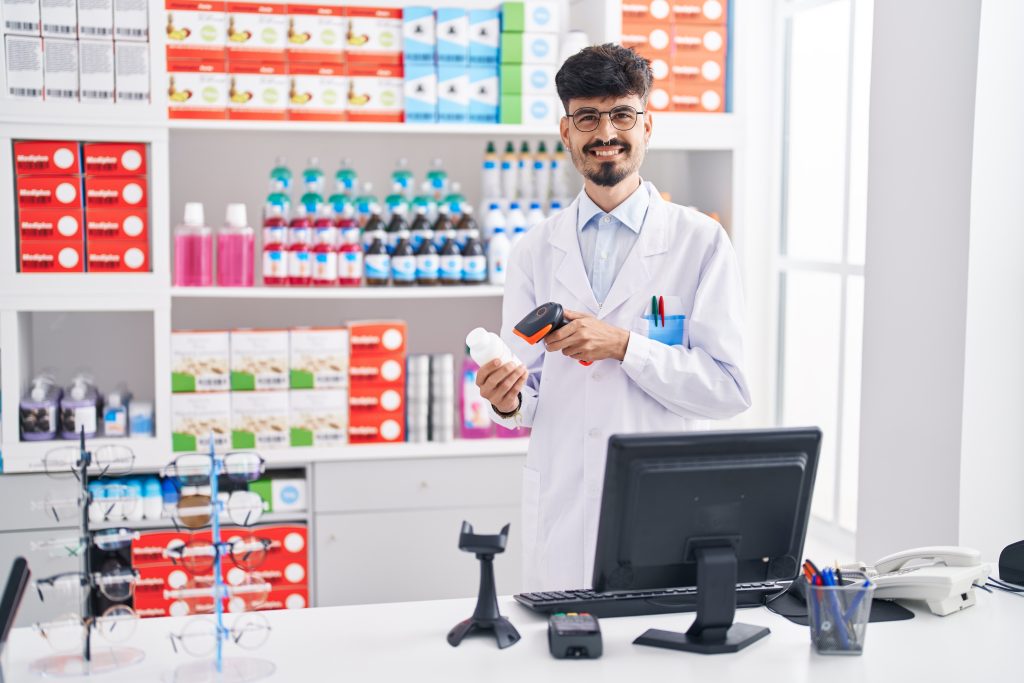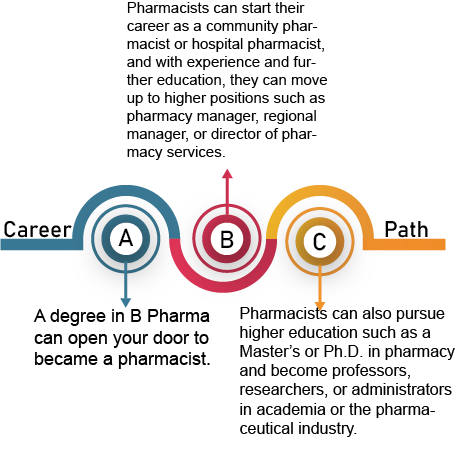Pharmacy is a field of healthcare that is responsible for the preparation, dispensing, and monitoring of medications, as well as providing pharmaceutical care to patients. The field of pharmacy is an essential part of the healthcare industry and plays a critical role in improving the overall health outcomes of patients.

Work description
- Pharmacists work in a variety of settings, including community pharmacies, hospitals, clinics, and research institutions.
- They are responsible for reviewing prescriptions, ensuring their accuracy, and dispensing the appropriate medications.
- They also provide medication counseling to patients, checking for drug interactions, and providing education on how to use medications properly.
High Demand
High demand for pharmacists due to an aging population and increasing healthcare needs.
Lucrative salaries
Opportunity to work in a variety of settings such as hospitals, retail pharmacies, research labs, and pharmaceutical companies.
Opportunities for innovation
Above-average earning potential with opportunities for advancement.
Versatility
Ability to help people by improving their health outcomes and quality of life.
Flexibility
Job security due to the essential nature of healthcare.
Job satisfaction
Continuous learning and development opportunities to stay current in the field.
High stress
Extensive education and training required, including a Doctor of Pharmacy (PharmD) degree.
Long hours
High student loan debt due to the cost of education.
Competitive field
Long working hours, including evenings and weekends, especially for those working in retail pharmacies and hospitals.
Constant learning
Potential for high stress due to the responsibility of handling and dispensing medication.
Isolation
Limited job opportunities in certain geographic areas.
Eye strain and other physical health issues
Limited job opportunities in certain geographic areas.
The cost of pursuing pharmacy as a career in India can vary depending on various factors such as the type of institution, the course duration, and the location of the institution. Generally, pursuing a Bachelor of Pharmacy (B.Pharm) degree from a government college or university can cost between 50,000 to 2 lakhs Indian Rupees (INR) per year.
However, if one opts for a private institution, the cost can go up to 3 to 5 lakhs INR per year. Additionally, pursuing a Master of Pharmacy (M.Pharm) degree can cost between 50,000 to 3 lakhs INR per year. Other expenses such as accommodation, transportation, books, and materials may add up to the total cost. Overall, one can expect to invest anywhere between 2 lakhs to 15 lakhs INR to pursue pharmacy as a career in India.
[wpcharts type=”horizontalbarchart” bgcolor=”red:gray:yellow,blue:gray:yellow,random:gray:yellow,purple:gray:yellow” min=”0″ legend=”true” titles=”2 year , 5 year” values=”3,7,5,12″]
The salary of a pharmacist in India can vary depending on the location, experience, and job responsibilities. The average starting salary for a pharmacist in India is around INR 2.5-3.5 lakhs per annum, with more experienced pharmacists earning up to INR 10-15 lakhs per annum.
[wpcharts type=”horizontalbarchart” bgcolor=”red:gray:yellow,blue:gray:yellow,random:gray:yellow,purple:gray:yellow” min=”0″ legend=”false” titles=”Entry-Level, Mid-Career, Senior-Level ” values=”5,15,25,35,45,55″]
Strong foundation in sciences, including biology, chemistry, and anatomy.
Good communication skills to effectively interact with patients, healthcare providers, and colleagues.
Attention to detail and ability to manage complex information, including medication dosages and interactions.
Critical thinking skills to assess patients’ health conditions, medication regimens, and potential side effects.
Strong work ethic, including attention to deadlines and accuracy in dispensing medication.
Customer service skills to provide high-quality patient care and resolve issues and concerns.
Flexibility and adaptability to work in different settings and handle unexpected situations.
Difficulty with time management and organization, as pharmacy can be a demanding and fast-paced profession.
Poor communication skills, including language barriers, which can hinder effective patient counseling and healthcare team collaboration.
Weakness in sciences or difficulty with memorization, which are critical components of pharmacy education and practice.
Inability to handle stress and pressure, as pharmacists may encounter challenging patients, complex drug therapies, and high workload.
Ethical lapses or violations, which can have serious consequences on patients’ health and the pharmacy profession’s reputation.
Inability to work in a team or collaborate with other healthcare providers, which can hinder patient-centered care and quality outcomes.
Poor customer service skills, which can lead to patient dissatisfaction and negative reviews.
Work-life balance
As healthcare professionals, pharmacists are responsible for ensuring patients receive safe and effective medications. The work-life balance of a pharmacist can vary depending on the setting they work in. Community pharmacists often have more regular hours and weekends off, whereas hospital pharmacists may work rotating shifts, including nights and weekends.
However, regardless of the setting, pharmacists must often work long hours, standing on their feet for extended periods, and dealing with stressful situations. To achieve a healthy work-life balance, pharmacists may need to prioritize self-care, set boundaries, and make time for hobbies and social activities outside of work.

Improving patient health outcomes by ensuring safe and effective use of medications
Providing medication counseling and education to patients and healthcare providers
Collaborating with other healthcare professionals to optimize patient care
Conducting drug utilization reviews to identify and prevent medication-related problems
Ensuring compliance with drug laws and regulations
Promoting public health through medication management and disease prevention initiatives
Clinical pharmacy
It involves the practice of optimal use of medication to get best outcome through the provision of drug information and monitoring of drug use.
Hospital pharmacy
It is the practice of management of medicines and drugs in hospitals, clinics, and nursing home.
Ambulatory care pharmacy
It involves the practice of providing medicines and healthcare services to people in rural areas especially to geriatric population.
Consultant Pharmacy Machine Learning
It specializes in handling of medication reviews, documentation, and administration.
Oncology pharmacy
It deals with providing patient-centered medication which are evidence based, therapy management, and patient care for people with cancer.
Conclusion:
In conclusion, pharmacy is a promising career in India with a wide range of job opportunities, specializations, and career growth opportunities. With the increasing demand for healthcare services and the growing pharmaceutical industry, pharmacists play a critical role in improving patient health outcomes, making it an important and rewarding career choice.



